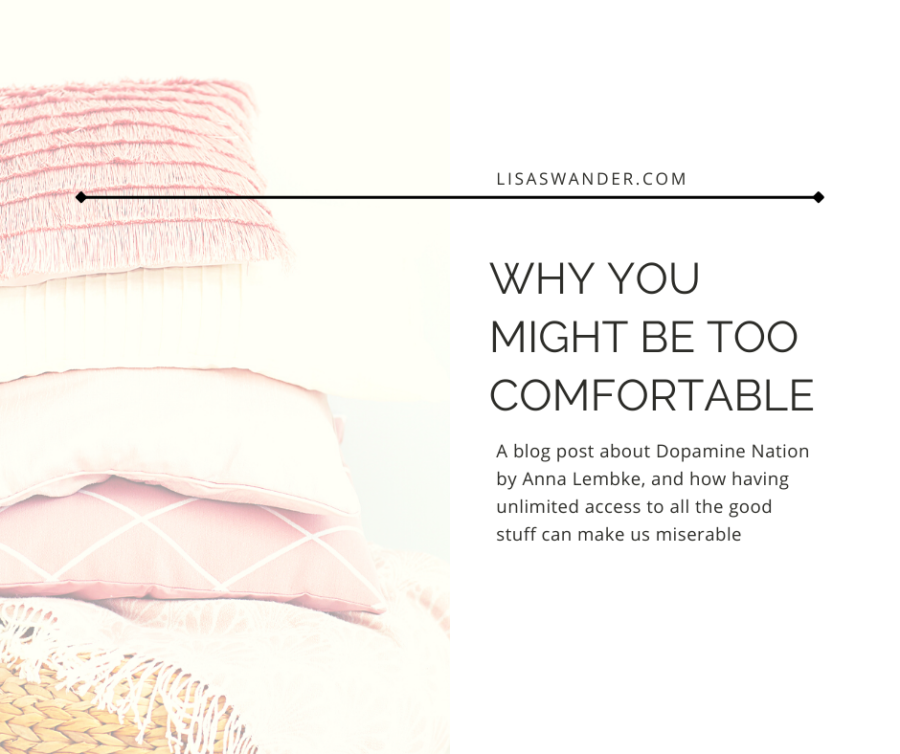I’m a big fan of comfort.
Take right now, for instance. I am sitting in a soft chair at my just-right desk with a space heater pointed at my feet. I am consuming a second cup of my favorite tea, held at the perfect temperature in an insulated mug. My stomach is still full from the snack I ate twenty minutes ago. I am engaged in meaningful work, but should I tire of it, there is a tab open behind this one with a string of Conan segments I can play with the click of a button.
I’m quite comfortable.
Too comfortable.
Before this week, I would not have believed such a thing could exist. I like my showers hot, my fabrics brushed, and my sugars refined, and I was pretty sure whatever comfort I could steal in the middle of this cold, brittle world was the least of what it owed me in exchange for being alive.
Then I read Dopamine Nation.
Oh boy. You should read it, too.
I first heard Anna Lembke talking about dopamine saturation on Metaphysical Milkshake last week. Then, in true addict form, I bought her audiobook immediately after and binge-listened to the whole thing on Audible in two days.
I was, as the kids say, shook.
I’ve written about dopamine and other happiness-inducing brain chemicals before, usually from the vantage point of not having enough of them. But Lembke’s research shows that if you feel anxious, depressed, or generally miserable much of the time, it’s probably because you have access to way too MUCH dopamine.
Just when I thought I had something figured out.
Turns out it’s not great to have constant, on-demand access to good feelings. Too many whacks of the dopamine stick will reset your baseline for pleasure, and you’ll need more and more of your drug of choice to feel anything at all.
Yes, Lisa, you’re saying. We know. We took DARE in fifth grade, we listened to Nancy Reagan, and this is why we don’t do drugs.
Correct, but the thing that Dr. Lembke (and others) are saying is that this can happen with anything. Anything that spikes the dopamine levels in your brain resets your pain/pleasure balance. If you have enough access to it, anything you super duper enjoy—or anything that sweeps you out of your discomfort on demand—can put you into a resting state of malaise.
And odds are good that you have that access.
I certainly do. It’s in this handy device sitting next to me at this very moment. The one with an unlimited quantity of likes, posts, Pins, clothing stores, news articles, and Lord of the Rings DVD extras available to me at any time. Any time I feel the slightest tinge of sadness or loneliness or just not wanting to write the next paragraph, it’s there. Ready to ferry me away from my discomfort.
I knew Instagram and Twitter and Facebook were bad for me. We all do. Pete Holmes has a joke about how, when he tells people he’s taking a break from social media, the only question no one ever asks is, “Why?”
But I think I thought it was bad for me because I was using it to compare myself to others. Or because I was reading the comments. Or because I was counting likes in my sleep. Or because it was dampening my creativity.
The truth, though, is that it’s not really even social media. Or it’s not just social media. It’s all of it. It’s all the things I like to look at during tiny glimpses of frustration or restlessness. It’s all the ways that having a little glowing escape on my person allows me to sidestep suffering with a single swipe.
Your drug of choice might be different than mine. Or, like me, you might have more than one (have I ever mentioned that I like cookies?). If you read the book, though, you’ll take it easy on yourself about it. Lembke points out that modern society isn’t built for us to consume anything in moderation. It takes work, obsession even, to be able to sit with discomfort in a world where absolutely everything works with us to avoid it.
She does present some solutions. You can court a bit of suffering in your life. Take a cold shower or watch an episode of Calliou, just to see if you can stand it. Dopamine is more stable when it rushes in to compensate for pain, so a little pain will actually leave you feeling better than an entire day of scrolling Pinterest.
But the simplest solution is also the oldest—take a break from your drug. It is Lent, after all, another fine example of how ancient people, while not great at germ theory or human rights, may have understood the human psyche better than we do.
For now, I’ve taken everything interesting off my phone. I’m currently running on Google Maps, the weather app, email, and messages. I can confirm that none of them are interesting, but I can also confirm that that doesn’t keep me from tapping the screen whenever I walk past it, like an eager polar bear hoping for her Dharma initiative treat.
I do feel better. There’s even a bit of sweet nostalgia in remembering what it was like to delay gratification. Listen to Pete say it better than I can. Then read the book. Then maybe even try it yourself, and we can all suffer a little for our dopamine together.


